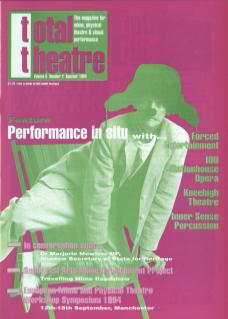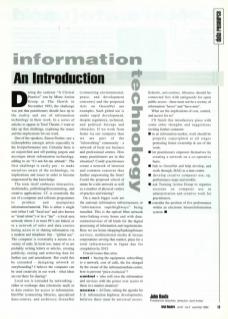During the seminar ‘A Critical Practice’ run by Mime Action Group at The Hawth in November 1993, the challenge was put that practitioners should face up to the reality and use of information technology in their work. In a series of articles to appear in Total Theatre, I want to take up that challenge, exploring the issues and the implications for our work.
One of the speakers, Simon Poulter, saw a technophobia amongst artists, especially in the live/performance arts. Certainly there is an unjustified and off-putting jargon and mystique about information technology, adding to an ‘it's-not-for-me attitude’. The first challenge is easily put – to make ourselves aware of the technology, its implications and issues in order to become empowered by that knowledge.
The term itself embraces interactive, multimedia, publishing/disseminating, and creative applications. I.T. is essentially the use of a computer and software programmes to produce and manipulate information/material. This is either a single unit (what I call ‘local use’ and also known as ‘stand alone’) or in a ‘LAN’ – a local area network where two or more PCs are linked, or in a network of units and data-centres having access to or sharing information via a modem and telephone line – ‘global use’. The computer is essentially a means to a variety of ends. In local use, many of us are probably writing letters or articles, creating publicity, storing and retrieving data for further use and amendment. But could this be extended – to designing artwork or storyboarding? I believe the computer can be used creatively in our work – what ideas are out there for sharing?
Local use is extended by networking – either to exchange data (electronic mail) or to data centres for access to information. InterNet (connecting libraries, specialised data-centres, and archives); GreenNet (connecting environmental, peace, and development concerns); and the proposed Arts on GreenNet are examples. Such global use is under rapid development, despite regulatory, technical and political hiccups and obstacles. If we work from home via our computer then we are part of the ‘teleworking community’ – a network of local use business and professional centres. How many practitioners are in this situation? Could practitioners create a network of interests and common concerns thus further empowering the form? Could the proposed school of mime be a tele-network as well as a number of physical centres of practice and training?
On a much bigger scale are the national information infrastructures or ‘information superhighways’ being installed. This is the optical fibre network inter-linking every home and with data centres/services of all kinds for the digital processing of information and requirements. Here we see home-shopping/banking/leisure services, multinational media, and leisure corporations serving that market, with plans for a total infrastructure in Japan due for completion by 2015.
Crucial issues thus arise.
Cost – buying the equipment, subscribing to a network, cost of calls, the fee charged by the owner of the information/data-centre, how to prevent ‘price-exclusion’?
Control – who will own the information and services with the power over access to these in a market situation?
Access - Al Gore, setting the agenda for US information highway developments, believes there must be universal access. Schools, universities, libraries should be connected free with safeguards for open public access; there must not be a society of information ‘haves’ and ‘have-nots’.
What are the implications of cost, control, and access for us?
I'll finish this introductory piece with some other thoughts and suggestions inviting further comment:
- In an information market, work should be properly copyrighted at all stages protecting future ownership and use of the work.
- Let practitioners empower themselves by creating a network on a co-operative basis.
- Link to GreenNet and help develop, and work through MAG as a data centre.
- Develop creative computer use, e.g. performance maps and models.
- Ask Training Action Group to organise sessions on computer use in administration and creative work for practitioners.
- Consider the position of live performance within an electronic leisure/information system.
John Keefe is a freelance teacher, director, and writer.

